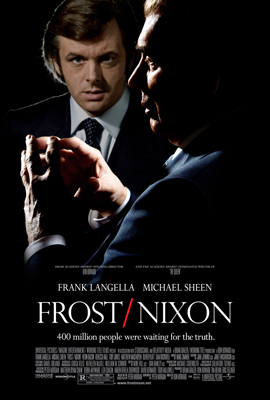“Frost/Nixon” remembers a time when presidents took credible journalism a bit more seriously. Was that a brash statement? Consider in recent events, the amount of presidential candidates that land guest spots on “Late Show with David Letterman.” A few days before the election, John McCain even appeared on “Saturday Night Live!”
Politics and entertainment are in a collision, and where is credible journalism to be found in all this? Ron Howard’s film recalls the days when the prospect of a talk show host interviewing an ex-president was considered to be absolutely absurd. How could anyone expect a talk show host to play hardball with Richard Nixon when all they’ve had practice with is pitching softballs?
There was little faith placed in David Frost’s ability to conduct the series of interviews with former president Richard Nixon and perhaps that was to Frost’s advantage. It’s easy to underestimate the Davids in view of the mighty Goliaths. Based on the play by Peter Morgan, “Frost/Nixon” dramatizes the sessions of interviews between the British talk show host David Frost (Michael Sheen) and former president Richard Nixon (Frank Langella) after he resigned the presidency. To both of them, the interviews brought mutual benefits. Knowing that over 400 million viewers tuned in to watch, Nixon gave his resignation speech and Frost saw the opportunity to draw in big numbers by doing a follow-up interview. For Nixon, the show brought the opportunity to exonerate himself from the Watergate cover up. That, plus he would also receive over half a million dollars for the paid interviews.
“Frost/Nixon” perceives the interviews almost as if they were a series of boxing rounds. The coaches prep their fighters, blows are dealt, the bell rings and the fighters rest up for the next round. This is a movie that finds drama in the intricate details leading up to the interviews. Howard crafts a film out of a series of scenes about phone calls, hotel rooms, note taking and research, which may sound a bit too dry for a drama. But Howard and his cinematographer give the film a Rembrandt style of lighting, which emphasizes a mood of intimacy, and puts dramatic power into each scene. Because the battle between Frost and Nixon is so epic, even the smallest of details contributing to the fight becomes fascinating.
The verbal battles are at the center focus of this film, but that does not mean the film excludes any kind of human story. These two men have everything to lose if they mess up the interview. Enormous pressure is placed on both of them to succeed. If Frost goes too soft, then no networks will pick up the interviews. And Nixon is no coward; he made mistakes, but he sure won’t let the cover up overshadow the good he managed to accomplish.
Langella is sure to land a best actor nomination as Nixon, for he embodies the complexity of the man in a way that is both humanizing and ferocious. The movie plays hardball with Nixon, but doesn’t devalue him as a man. As a political subject, Nixon has been widely controversial, but as a character, he is fascinating – as is the film. The film gives a context to the pain and humility that Nixon felt. He’s a man whom many may only know as the disgraced president forced into resignation. But this film sees more than that; it sees greatness in a man that was overshadowed by his heavy sins. This is one of the best films of the year.
Frost/Nixon is rated R for some language.







